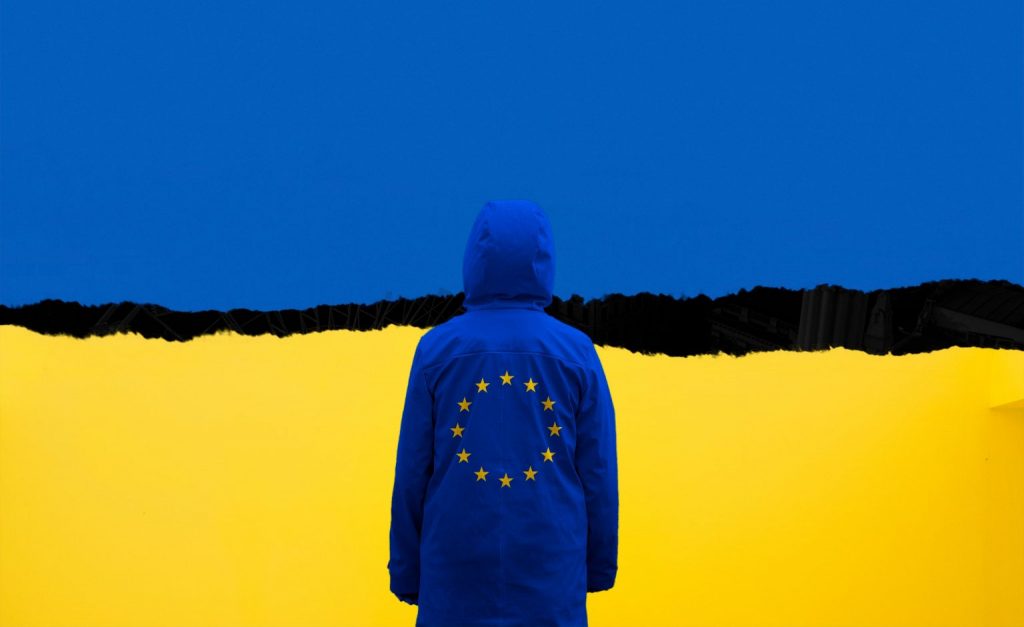What you can do to support Ukraine right now
We are saddened by the loss of lives and the increasing number of casualties in Ukraine. The images that are being broadcast by the media are heartbreaking.
We stand for protecting and strengthening democracy, contributing to social cohesion, and overcoming division. It is our core mission to defend and strengthen European democracy. We will be supporting Ukraine the best we can and we encourage everyone to do the same.
Here’s what you can do to help:
> Donate to official charities (see below)
> Verify your sources to avoid spreading false information and be mindful of what you share on social media
> Reach out to your government and elected officials and ask them to take meaningful action
> Take part in protests, demonstrations and activate your community to engage in supporting actions
> Offer to host displaced persons from Ukraine or volunteer your time and knowledge to aid migrants with translation, residency registration, transport or psychological support
> Support Ukrainian journalism
Official charities
> Caritas is distributing food and sanitary supplies, and a €25 donation will provide for an emergency aid package.
> The Red Cross is also supporting people in Ukraine with much-needed supplies.
> Doctors Without Borders also receives donations to support their efforts in Ukraine.
> UNHCR is providing humanitarian support to families in Ukraine.
> The International Rescue Committee helps provide food, medical care and emergencies support services.
> Betterplace.org has provided a comprehensive list of ways to donate.
> Alight is a humanitarian organisation that has sent teams of emergency response workers to Poland to help meet the needs of the growing refugee population, both material and psychosocial. You can make a donation here.
For those living in Poland, the city of Gdansk is coordinating volunteers and asking for donations through this website.
Stay safe online
European governments, organisations, publishers, brands and individuals have been sharing messages of support on social media using the hashtag #StandForUkraine.
Be careful of what you share! There is a lot of false information about the conflict spreading online, which is commonly referred to as misinformation and disinformation. You can help to curb the spread by doing the following:
> Question before sharing or re-posting: Does this look right? Does this sound accurate? Is this information from a reliable source?
> You can use this SHARE checklist to decide if the information you come across on social media can be trusted
Host a displaced person from Ukraine
Hundreds of thousands of people have become refugees as a result of the war, and one way to help is to offer accommodation if you can.
> The international, female based Facebook group Host a Sister is currently focusing their work on support for women fleeing Ukraine.
> The Elinor network as well as the German-language Facebook group Wohnraum für die flüchtende Ukrainer*innen/ житло для бiжинцiв з Украïни have been used to find accommodation for displaced people, as well as Austrian Facebook groups for international residents.
> You can reach out to the Austrian nationwide coordination centre which you can email at nachbarschaftsquartier@bbu.gv.at to indicate that you have space to host a refugee.
> If you live in Germany, you can provide overnight shelter for people from Ukraine here.
> Shelter4ua.com collects sign-ups from people all over the world who have a spare room and are willing to shelter refugees – simply go to their website and fill out the form under ‘I can help’.
> For ways to support BIPOC refugees, head to this resource.
> This document also provides many resources and ways that you can help.
> The website isupportukraine.eu also helps you host refugee families, attend events, and make donations
> You can welcome Ukrainian refugees by listing your home on Airbnb.org. Airbnb.com and Airbnb.org have launched Help Ukraine, a project to provide short- and long-term housing for up to 100,000 refugees. Here’s how to do that.
Psychological first aid
> nilohealth.com, a mental health services company in Berlin volunteers psychologists and psychotherapists that are specially trained for such crisis situations and immediately assists those in need with 1 on 1 sessions.
> The ‘Joint Efforts for Psychological Health (GPG)’ program at the University of Greifswald provides psychological help – to the extent possible – to members of the university community with Ukrainian but also Russian backgrounds, as well as the incoming Ukrainian refugees.
Support Ukrainian press freedom
It is more critical than ever to back up dependable Ukrainian reporting. Press freedom is a fundamental pillar of any independent state. Russian operatives have been seeding disinformation to destabilize Ukraine for over a decade and aggressively preventing accurate reporting on their attacks this week. Many Ukrainian journalists are now fearful of being physically attacked by Russian soldiers, and are racing to flee the country, which risks leaving a void where exemplary journalism formerly existed.
> A host of media support organisations across Europe have set up a fundraiser on GoFundMe to support the country’s independent media.
> Moreover, publishers like KatapultMagazin.de have focussed their efforts to aid Ukrainian press freedom by hiring 15 Ukrainian journalists, 14 of which are women.
> You can also donate directly to independent Ukrainian publications like the Kyiv Independent and the Ukraine Crisis Media Center.
